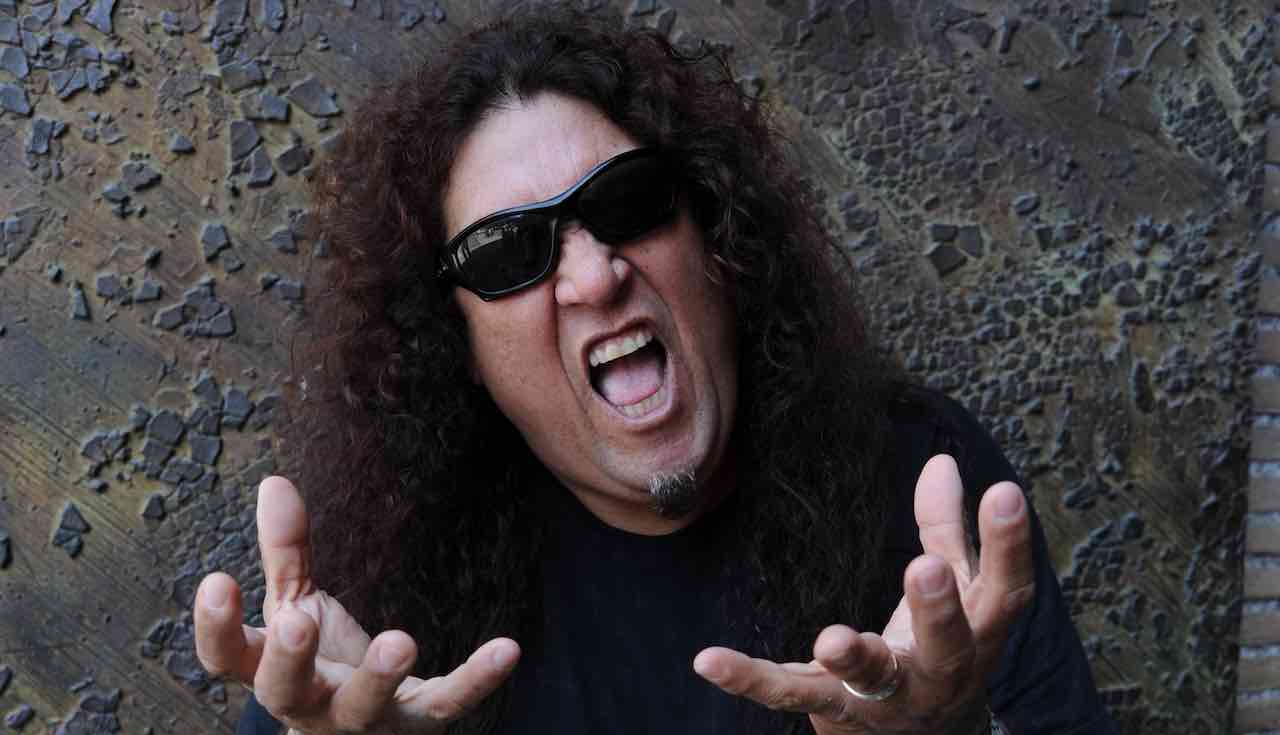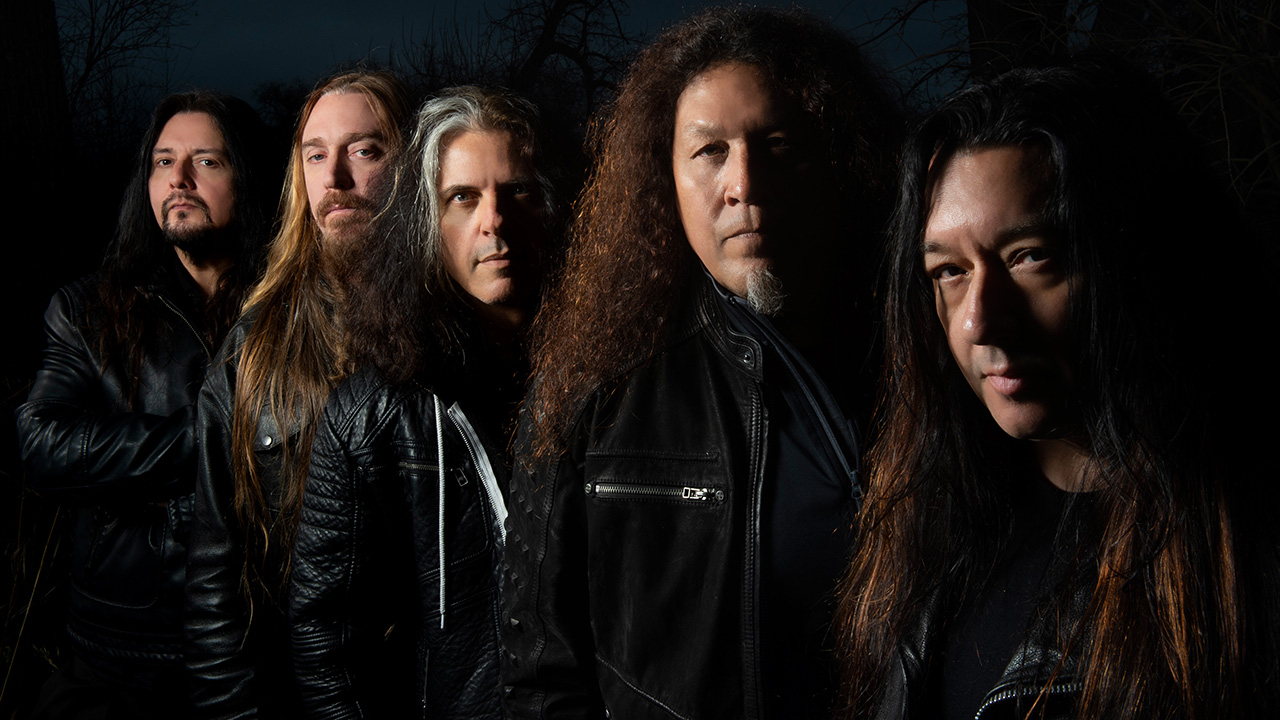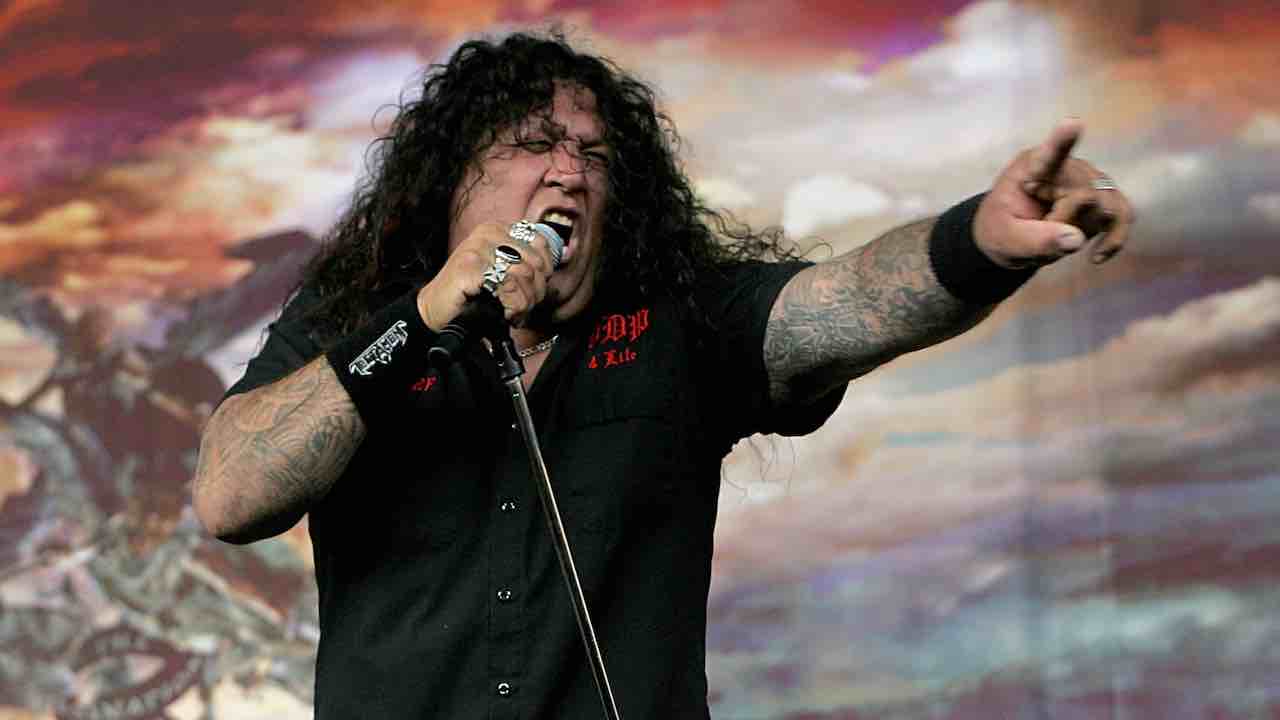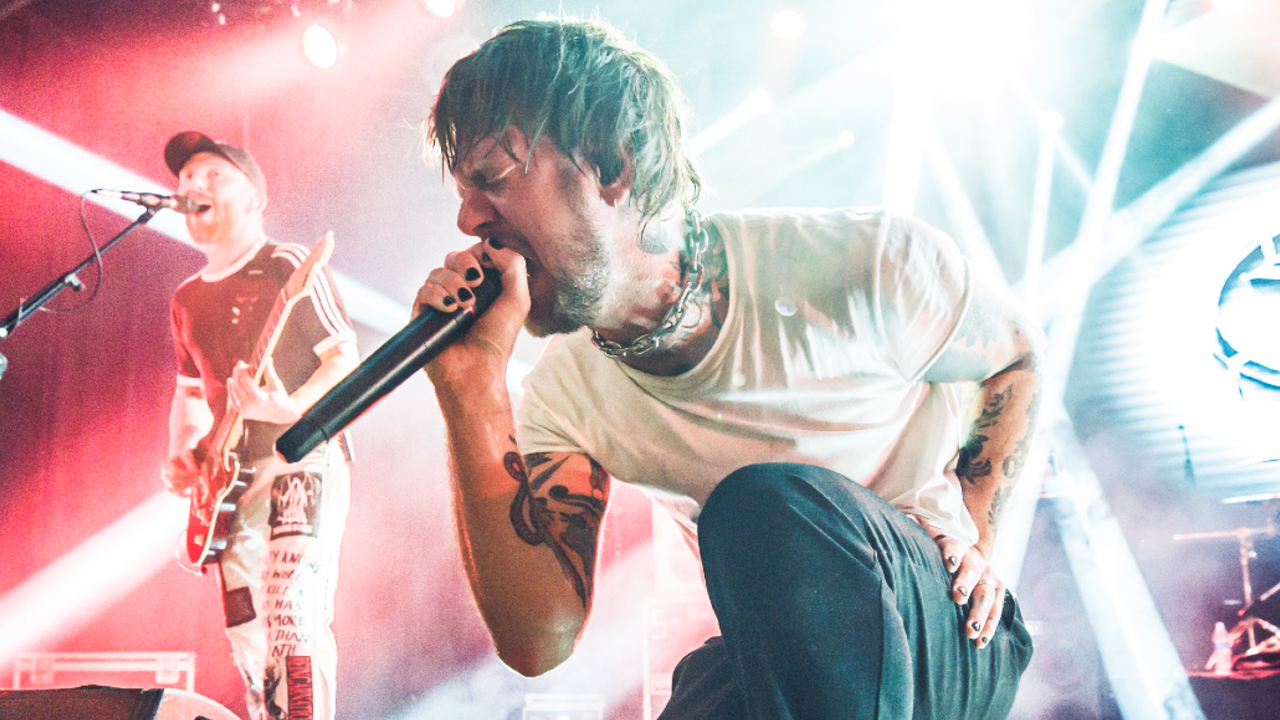Testament’s Chuck Billy: My Life Story
Aliens, auditioning for Sepultura and “shitting out” cancer: an epic interview with thrash legend Chuck Billy

Select the newsletters you’d like to receive. Then, add your email to sign up.
You are now subscribed
Your newsletter sign-up was successful
Want to add more newsletters?

Every Friday
Louder
Louder’s weekly newsletter is jam-packed with the team’s personal highlights from the last seven days, including features, breaking news, reviews and tons of juicy exclusives from the world of alternative music.

Every Friday
Classic Rock
The Classic Rock newsletter is an essential read for the discerning rock fan. Every week we bring you the news, reviews and the very best features and interviews from our extensive archive. Written by rock fans for rock fans.

Every Friday
Metal Hammer
For the last four decades Metal Hammer has been the world’s greatest metal magazine. Created by metalheads for metalheads, ‘Hammer takes you behind the scenes, closer to the action, and nearer to the bands that you love the most.

Every Friday
Prog
The Prog newsletter brings you the very best of Prog Magazine and our website, every Friday. We'll deliver you the very latest news from the Prog universe, informative features and archive material from Prog’s impressive vault.
Testament’s Chuck Billy was there at the birth of thrash. Born and raised in Northern California, he watched the scene spring up in the bars and dives of San Francisco’s Bay Area. “It was wild,” he says with a laugh. “We were wild.”
We're speaking a few weeks after Billy was diagnosed with COVID-19 following a European tour. “I’m back to a hundred per cent, I believe,” he says. “But we're all good now.”
Billy’s been a survivor throughout his career. He joined Testament in the mid-80s, just after they'd changed their name from Legacy following the loss of singer – and Chuck’s childhood friend – Steve ‘Zetro’ Sousa to rival Bay Area ’bangers Exodus.
Testament's first few albums saw them knocking on the door of the Big Four, but changing musical trends in the 1990s knocked them off course. By the end of that decade they’d got back on track with 1999’s The Gathering album, only for Billy to be diagnosed with cancer.
His recovery with the help of Native American healers is a remarkable story within itself (the singer is of Native American descent himself). As he returned to full power so did the band, restarting their career with 2008’s Formation Of Damnation. With new albums Titans Of Creation keeping the fire burning, Billy says he doesn’t see they day where he thinks of jacking it all in.
“Not yet. We all still feel 18, though the body doesn't agree sometimes. We still feel like we did at the beginning, but we've matured and learned how to get along with each other as human beings better. And that's a big part of staying together so long.”

When and where were you born?
Sign up below to get the latest from Metal Hammer, plus exclusive special offers, direct to your inbox!
I was born in Oakland, California, on June 23 1962. I lived in El Cerrito for the first or four years of my life, before we moved to Dublin, California.
Was it a working class family?
Yeah, my mom worked in a hospital delivering babies - she was a nurse. My father worked in the banking system, repairing their office machines. There were five boys in the family. I was the middle child. You pretty much pass the bullying down the line.
You started riding motorbikes in your teens. Where did the love of bikes come from?
We were always crazy, rambunctious kids to start with. The only time we were at home was to sleep and eat. We rode all kinds of dirt bikes around the hills of Dublin. A friend who was a little older had a Honda, and of course I wanted a motorcycle as well. So I got a Honda and kept it at their house, so my parents so my parents wouldn't know. Same with cars - I bought a car at 15 and kept it around the corner for years.
Were you mixing with proper bikers gangs back then?
Not in the 70s. We were riding Hondas, we weren't riding Harley Davidsons, so we weren't associated with the Hells Angels and all the club people. I did buy a Harley eventually. Just after we did the first Testament record [1987’s The Legacy] I got a little money and went and bought one.
When was the first time you sang onstage?
It had to be 1982. I was in a band called Rampage. It was in Danville, California, at a club called The Stage. It was called ‘Rage With The 'Page At the Stage', haha.

Were you the guy that had to be shoved onto the stage, or did you want to be in the limelight from the start?
Oh no, we were all hams. We were big rock stars in our heads. We were kids and we were still wearing striped Spandex and leather jackets. We were listening to bands like [cult early 80s metallers] Riot and Thin Lizzy and UFO. We were more hard rock than metal. The metal scene didn’t really exist back then.
Were you any good back then?
I've actually got a video of that first gig at The Stage. I have it on an 8mm reel-to-reel video. I was a maniac from the first show. I was jumping off the stage, getting out in the crowd.
When did you first become aware of the thrash scene?
We were in Dublin, which was about 45 minutes over the hill from San Francisco and the Bay Area. One of my friends, Willy, from Rampage ended up in Lȧȧz Rockit, which was a popular metal band in the Bay. That exposed us to a lot of stuff that was happening at that point.
We used to drink and party and go and hang out, so we were amongst it all. It was all house parties and club parties and studio parties after gigs.
Then Exodus put their demo out and everybody was digging it: 'Wow, what the hell is this? Holy shit.' And of course Metallica and Slayer would come up and play, and it all started happening quick. Ruthie's Inn was the spawning ground for that scene. The owner Wes would let a bunch of younger kids in. We’d drink under-age, steal bottles from the bar. The same people would go from there up the street to Keystone Berkeley, and then go out over the bridge to the Stone. It was exciting.
Testament were called Legacy before you joined. What did you think of them the first time you saw them? Did you think, ‘They need me in this band’?
There were good. Zet was my younger brother's best friend, so I went to see their gig in Alameda. It was Eric and his brother Derek on guitar, and they all wore priest collars. It was very entertaining. Like, 'Wow, these guys are pretty good.'
Shortly after that, Alex [Skolnick, guitarist] joined the band and did the demo, and that's when Zet played me the demo with three songs. I was, like, 'Wow, these are really mature songs for those kids I saw playing not too long ago.'
When Zet decided to leave to join Exodus, he kind of handed me the baton: ‘Call Alex, they need a singer now.’ At that point, I was, like, [determinedly] 'OK, I'm gonna find a band that I'm gonna join and be a part of it.' And I walked right into that band. The timing was perfect.
It sounds like you didn't take much convincing to join them. But were they convinced by you?
Those guys were wearing leather jackets and into Slayer and Mercyful Fate. They were, like, ‘I don't know about this guy, he wears Spandex and he’s got a streak in his hair.’ They were so against me not being the singer. But I got the audition.
I went down there but the room was so small that all of us couldn't fit in the room. I just put my PA speakers in the room and I stood in the hallway looking in the door, and I did the three songs that they'd done on the demo, and I thought I killed it. They said, 'OK, you've got it but you've got to dress different. You've gotta wear Levis and a leather jacket and a T-shirt. No more Spandex.’ That was a turning point in my life.
Testament released five records in five years between 1987 and 1992. What was it like being in the eye of the hurricane?
It was crazy, but then we were just kids dying to get out on the road and get out of mom and dad's house. There was no time to relax and think about what was happening. We'd seen it growing. By our third album [1989's Practice What You Preach] we were on Atlantic, the same label as AC/DC, and it's like, ‘Holy shit, we got a six record deal, we're doing it.’
Those early albums were all great, but they never really took you to the level of Metallica or Slayer. Be honest: were you jealous?
Well, we were right on that ledge, Those first three records going into the fourth record, we were selling 250-300,000 units in Europe and America. We were moving up to Gold record status. I think if the scene would have continued we might have hit it, but the rug was just pulled out right then.
People say grunge killed hair metal, but it pretty much did the same to the original thrash scene too. Did you think, ‘We're screwed now’?
The 90s was tough for us. The scene was changing. The Low record in 1995 was the end of our deal with Atlantic and Alex had left the band the record before, so that record was a little more angry. Then with the Demonic record [from 1997], we were pissed off at the world, pissed off at the industry. It was a weird period: we were just so angry. But then ’99 came and we got together with Dave Lombardo and James Murphy and did The Gathering, and that really brought us back. It was such a different Testament record, but it really set the bar for us: ‘This is what we've accomplished, we can't do less than this.’

Did things ever get so bad in the 90s that you came close to quitting?
Well, yeah. In 1997, I auditioned for Sepultura. It was right at that point where the record deal's over, we didn’t have a band, it was just really tough. I thought, ‘Maybe I should just look for another band that's established out there.'
But I came in too late to the party with Sepultura. I turned in my demo too late. They said, 'Oh, we loved it but we already told Derrick [Green, Max Cavalera's replacement] he got the gig.' But things happen for a reason.
You put out The Gathering, and things got back on a more even keel. And then in 2001 you get diagnosed with cancer. That must have been a huge blow?
Yeah, we did The Gathering, we were excited with Lombardo and Murphy in the band, we're touring, and then the craziest thing in the world happens. A lady knocks on my door and asks if I'm interested in selling my house, cos she has a client that wants to buy this house.
Long story short, I sold my house and moved to another place, which was just far enough where we had to get new dentists and new doctors and everything. So I went and got a physical. And they called me that night and said, “Hey, come back in, we see a mass in your chest, we need to do further X-rays.’ So we did that and the doctor said, 'Don't do anything else, that mass in there could erupt.'
I probably would have died if that person hadn't knocked on my door. I probably would have just kept on going on and it would have eventually erupted and I world have been gone.
Did you ever think, ‘I'm going to die?’
The first day when the doctor told me I had cancer, it went in one ear and out the other almost. I came home and my wife's, like, ‘Hey, how did it go, what did the doctor say?’ I go, ‘Oh, he said I have cancer.’ And when I said it, it hit me like a ton of bricks and I broke down. I was destroyed that whole day.
That's when it crosses your mind: ‘I got it, I'm gonna die.’ But then I woke up the next day and I was, like, ‘This is bullshit, I'm fighting, I'm gonna have at it, fuck this.’ I thought about what I wanted to do, and I knew that I was going to do the chemo and whatever I had to do. But I wanted to explore my Native American heritage spiritually to help me get through mentally and stay focussed on getting better. So that's what I did. I made contact with a Native American healer.
Would you have been sceptical about that before you got your cancer diagnosis?
I was raised Catholic – my mother's very religious and I learned all the stories. But I'm Native American, and I have this culture and heritage and spirituality that I never explored. Because I was thinking, ‘Am I going to die? Is this is?’, I want to explore that. Even if it was to have something to get my mind off what I was doing.
Going into, I'm sceptical, not knowing what these guys are going to do, whether they’re to chant and beat the drum and nothing's going to happen.
The first guy, Charlie, had a feather and did the healing dance and ceremony, he told me that the wind was going to be my spirit guide after all this. I didn't understand what he was saying until used the toilet and got rid of the cancer in the toilet one very windy night.
What do you mean?
We’d had a party and there was a bunch of beer cans on the side of my house. That night I couldn't sleep – I'd been having stomach issues that week and my stomach was bothering me. So I went downstairs in the guest bathroom, and sat on the toilet.
As I was sitting there, I heard those beer cans in a little funnel cloud outside my window. And I went actually did what I was doing, and whatever I released out of me I had this overwhelming sensation that I'd just got rid of that illness. And at that same exact point the wind stopped and the beer cans hit the ground and stopped.
I was just was, like, ‘Wow, I just got rid of the cancer.’ I went and woke up my wife and said: 'Hey, you're not gonna believe this, but I just basically shit out the cancer downstairs, it’s gone.’ She’s, like, ‘What? Shut up’, and went back to bed.
And that week, when the doctor said the tumour was cancer-free, I was looking at him and I went, ‘Shut up. Fuck off. Holy shit.’ And I really felt it. In that moment when I was sitting on the toilet and the wind stopped, that sensation was there. I experienced something.
Have you carried on exploring your Native America heritage since?
There's a reservation about two-and-a-half hours away, and my grandparents and cousins are up there up there. I’ve started volunteering as the MC at the annual Fried Bread competition they have. They get the community in the centre of town and they have a bunch of tribal dancers from different communities come down and dance, there's basket-weaving and jewellery and food. They have a band playing and I'm the MC giving away the gifts. And now I'm elected to the Cannabis Council for our tribe - they're thinking about going into the weed-growing business.
Are you a bit of a smoker yourself?
I am. Unfortunately I’m a very good smoker.
On a scale of zero to Cheech & Chong, where do you sit?
I'm Cheech and Chong, haha. I don't smoke weed on tour any more, so before i go out I'll stop for a week or two and go through my withdrawals and just be a dickhead for a week. And then I get home and I smoke my first joint for six weeks and it's like going back and being in eighth grade again. I'm high as hell. Now I've been home, locked up, I'm smoking probably an ounce-and-a-half a week. That's just by myself.
Were you ever into anything stronger than weed?
I tried cocaine and I never liked it. When we were young, crank [methamphetamine] was a big thing. I have no idea where to even find that stuff now. It's just weed now. I even quit drinking over five years ago.
The first album since you got the all-clear from cancer was Formation Of Damnation in 2008. It seems to have been full steam ahead since then. Have there been any bumps in the road?
That record was interesting. We had our reunion in '05 and '06, with Alex and Greg [Christian, bassist] and Louie [Clemente, drummer], the original guys. We just got asked to do five shows and it turned into three months and then into three years. We never really talked about it, we let it happen. And then we kind of looked at each other and said, ‘We made it and survived and didn't break up or argue, what do you think about making a record?' And we all said, ‘Sure, let's try it.’
There were some money-related problems between you and your ex-bassist Greg Christian after he left the band a few years ago…
[Interrupting] There's never been any problems with me and Greg. I just don't think me and Greg see eye to eye. I've done the business since they beginning, and he's never been involved in that, and I think he just sees it different. We argue about that, but I don't have anything against him.
We just did the Metal Allegiance show in NAMM last year, and they [Christian’s new band Trauma] asked to be the opening act. I'm like, 'Let 'em come down and jam.' Me and Alex saw Greg that night. We caught up: ‘Hey, how you doing?’
You used to be into bikes, but now you’re into boats. What's the longest you've been out at sea for any one time?
Well, I go shark diving off Ensenada in Mexico. We go out for seven days to the Guadeloupe Islands and dive with the sharks in cages.
That always sounds terrifying.
It is. Sometimes the sharks will hit the cages and try to get in it. But it's an 18-20 hour boat ride to get out there and an 18-20 hour boat ride to get back. You're way out there.
Testament’s 2016 album Brotherhood Of The Snake was partly inspired by the idea of the aliens planted the seeds for civilisations here on earth. Do you really believe that?
My mind is open to the possibility. When I watch shows like [alien-themed documentary series] Ancient Aliens and you have these guys showing drawing in caves from thousands of years ago and from different cultures that have similar beings and things flying through the sky, it just opened my mind to thinking, 'How the hell?' There's got to be some sort of connection. There's got to be something they've seen in common. It made me think, 'Are we just in this small window of time now, repeating a cycle that's happened before? Global warming - are we back doing it again in another cycle? These epidemics , will they start again in another time?’ So it opened my mind to the possibilities that we aren’t only ones here.
On a completely different subject, what would a Chuck Billy solo album sound like?
I want to do one, and do it different. I would actually do a couple of different records, As a solo artist, I would want to do more death metal stuff vocally. But also I'm interested in doing more bluesy stuff. I think I got that slow rasp and tone. I listen to a lot of that stuff when I'm on the golf course. I really enjoy it. I think, 'Man, this would be a good challenge, to do some blues.' I need to hook up with Joe Bonamassa.
What do you miss about the old days?
Well, I'm pretty straight right now, but I miss a good party. I miss the scene that we had. The scene won't ever be like that ever again. That's what I miss.
What's best: being in Testament now or being in Testament in 1987?
Being in Testament now. There's two eras of the band - before The Gathering and after The Gathering. Totally different bands, totally different eras. I think we've accomplished some great stuff in the new era. Where the old eras, we were partying like rock stars – sex, drugs, rock'n'roll. We couldn’t have continued at that pace. We’d have died.
Titans Of Creation is out now.
While you’re here, why not take advantage of our brilliant new subscribers’ offer? Get a digital pay monthly subscription for as little as £1.78 per month and enjoy the world’s best high voltage music journalism delivered direct to your device.
Dave Everley has been writing about and occasionally humming along to music since the early 90s. During that time, he has been Deputy Editor on Kerrang! and Classic Rock, Associate Editor on Q magazine and staff writer/tea boy on Raw, not necessarily in that order. He has written for Metal Hammer, Louder, Prog, the Observer, Select, Mojo, the Evening Standard and the totally legendary Ultrakill. He is still waiting for Billy Gibbons to send him a bottle of hot sauce he was promised several years ago.

